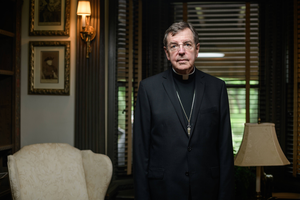Michigan Catholic Conference: Whitmer Ought to Back School Choice Bill, Not Veto It
“Parents are the primary educators and have the right to determine which school is best for their children,” Hickson said.

The Michigan Catholic Conference has welcomed the passage of legislation that would help fund scholarships for private and religious K-12 schools and pay some expenses for public school students, though Gov. Gretchen Whitmer has promised to veto the bills.
“The legislation will provide parents with greater tools to ensure academic success for their children regardless of the educational setting, represents an important and meaningful policy change, and is a step forward toward helping Michigan catch up to dozens of other states—including almost every state in the Midwest—that are much further along in offering school choice options to parents,” Tom Hickson, the Michigan Catholic Conference vice president for public policy and advocacy, said Oct. 27.
“Parents are the primary educators and have the right to determine which school is best for their children,” Hickson added. “We commend the leadership of the Michigan legislature for passing these bills and encourage the governor to sign them into law, thereby providing parents with an important tool to help toward their children’s educational success.”
The legislation would create Educational Savings Accounts that would give students access to the financial resources to use towards qualified expenses in public and non-public schools, the Catholic conference said.
Private donors could give money to specially created organizations, which would then give funds to qualified students for educational purposes. Donor contributions would be entirely tax-deductible.
Eligible private school students could receive over $7,800 per year from scholarship programs set up under the law, the education news site Chalkbeat reports. Eligible public school students could receive up to $500 or $1,100 if they are in special education programs for various purposes including tutoring, extracurricular activities, books, computers, summer programs, speech therapy, or eligible transportation costs.
There are about 1.8 million Catholics across seven Michigan Roman Catholic dioceses in a state whose population totals just under 10 million. The state’s 36 Catholic high schools have about 12,500 students, while 166 elementary schools have over 33,200 students. Catholic school teachers employ about 3,300 lay teachers and about 50 priests or religious, according to the Catholic conference.
Overall, there are about 150,000 students enrolled in the state’s K-12 private schools. By comparison, nearly 1.5 million students are enrolled in the state’s K-12 public schools, according to a September report on education statistics from the Education Data Initiative.
The nonpartisan Senate Fiscal Agency said the bill would reduce state revenue “by as much as $500 million in the first year it was effective, with the potential for the revenue loss to increase 20% per year in later years.”
The revenue would not affect the annual school aid budget, now totaling a record $17.1 billion, which was approved in a bipartisan agreement earlier this year, the Detroit Free Press reports.
The relevant bills are House Bills 5404 and 5405, respectively sponsored by Republican State Reps. Bryan Posthumus and Phil Green, and Senate Bills 687 and 688, respectively sponsored by Republican State Sens. Tom Barrett and Lana Theis.
“No matter a student’s background, we should be doing more to support parents, so they can have a more active and impactful role in their children’s education,” Theis said, according to the Detroit Free Press.
The House bills were first approved in the Republican controlled legislature last week. They passed Oct. 27 by a final vote of 55-49, the Associated Press reports. The Senate has also passed the bills.
Hickson said the bills were “introduced and acted upon quickly”, but after evaluating the bills the Michigan Catholic Conference is now supporting them.
However, Bobby Leddy, a spokesman for Whitmer, said the legislation was a “nonstarter.”
“The Michigan Constitution sets up a system of school funding designed to ensure the quality of free public education in Michigan,” Leddy said, according to the Detroit Free Press. “This legislation undermines that constitutional guarantee, permitting the diversion of hundreds of millions of taxpayer dollars annually to private institutions. Michiganders are tired of the attempts to force a Betsy DeVos-style voucher program that drain resources from our public schools.”
DeVos, the U.S. Secretary of Education under President Donald Trump, was cited by every Democratic legislator who argued against the bill. They said it served her interests.
DeVos is a wealthy Michigan resident. She and her family are major donors to many Republican-leaning causes and she is a major backer of school choice programs.
Foes of the legislation include the Michigan Association of School Boards, whose membership includes over 600 boards of education.
Critics like Democratic State Sen. Dayna Polehanki, a former teacher, said the proposal was unconstitutional.
In 1970, Michigan voters approved a constitutional amendment that bans public funds and public credits for any non-public school. The amendment also bars indirect payments and is considered the strictest ban in the U.S., according to the Associated Press. In the 2000 election, voters strongly rejected a constitutional amendment that would have declared a constitutional right to school vouchers.
However, the Michigan Supreme Court recently upheld a court ruling that allows the state to reimburse the costs of private schools’ compliance with state-mandated rules, including recordkeeping and background checks for teachers.
According to Chalkbeat, the Michigan legislation is similar to that which passed in Montana, whose ban on state programs for private school tuition was narrowly overturned by the U.S. Supreme Court in 2020.
The Second Vatican Council's 1965 declaration on Christian education, Gravissimum educationis, said that parents “must enjoy true liberty in their choice of schools.”
“Consequently, the public power, which has the obligation to protect and defend the rights of citizens, must see to it, in its concern for distributive justice, that public subsidies are paid out in such a way that parents are truly free to choose according to their conscience the schools they want for their children.”
- Keywords:
- michigan catholic conference
- school choice
- whitmer















